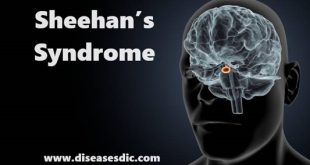Definition
Sundowner’s syndrome is a behavioural condition represented by a collection of symptoms. The exact cause is unclear, but some specialists believe it happens when a person’s biological clock is off kilter. This is often due to disturbances in their circadian rhythms or sleep cycles.
Many doctors and neuropsychiatrists believe there’s a direct connection between brain deterioration and an increased prevalence of sundowner’s symptoms. This is one reason the

Pathophysiology
To date, no unifying explanation of the pathophysiology of sundowning has emerged in the literature. However, one of the most accepted biological mechanisms involves the dysfunction of the body’s circadian rhythm in sundowning.
The part of the nervous system that controls circadian rhythms, and thus sleep-wake cycles, is the suprachiasmatic nucleus(SCN), which receives sensory input from photosensitive cells in the retina via the
It has been shown that patients with severe dementia have neuropathological changes in the SCN. It has been hypothesized that these changes may be linked to the disordered circadian rhythm that many clinicians observe in patients with severe dementia.
Risk factors
- Initially, Alzheimer’s disease, about 20 to 30 percent of the patients of Alzheimer’s experience this syndrome at some point in their lives.
- Person’shistory of substance or alcohol abuse increases the risk of experiencing sundowning syndrome, with chronic symptoms. Some of the behavioral motions are linked with this syndrome.
- Day and night experiences changes
- Poor sleep
- Stress level increases after visiting a doctor or an unknown face
- Shadowsincrease fear paranoia
- A care giver who is exhausted and frustrated
Causes
Some of the causes of Sundown Syndrome:
Too Much End-of-day Activity: Some researchers believe the flurry of activity toward the end of the day as the facility’s staff changes shifts may lead to anxiety and confusion.
Fatigue: End-of-day exhaustion or suddenly the lack of activity after the dinner hour may also be a contributor.
Low Light: As the sun goes down, the quality of available light may diminish and shadows may increase, making already challenged vision even more challenging.
Internal Imbalances: Some researchers even think that hormone imbalances or possible disruptions in the internal biological clock that regulates cognition between waking and sleeping hours may also be a principle cause.
Winter: In some cases, the onset of winter’s shorter days exacerbates sundowning, which indicates the syndrome may have something to do with Seasonal Affective Disorder, a common depression caused by less exposure to natural sunlight.
Symptoms
The overall symptoms associated with sundowner’s syndrome involve dramatic changes in behavior as early evening or night-time approaches. Specific signs of possible sundowner’s syndrome include:
- Increased agitation as evening draws near (typically occurs between 5 p.m. to 11 p.m.)
- Drastic mood swings or changes in personality with no external trigger, other than sunset
- Shows signs of mental confusion often accompanied by difficulty thinking or speaking clearly
- Experiences sleep disturbances like restlessness, waking in the middle of the night or insomnia
- Develops aggressive or violent behavior including yelling
- Becomes overly paranoid and may begin to hallucinate
Complications
- This syndrome can increase injury or likelihood of a person with Alzheimer’s or dementia. They might require an essential medical advice.
- Some patients become more violent and agitated, that can potentially result in getting injured.
- Some researchers of Psychiatry Investigation suggested that this disorder might deteriorate mental function speedily with Alzheimer’s patients.
Diagnosis
A diagnosis of Sundowners or sundowning disease is similar to the diagnosis for Alzheimer’s disease and dementia.
To diagnose sundown syndrome, doctors will use similar tactics that are used to diagnose Alzheimer’s disease or dementia. Because sundown syndrome stems from dementia and cognitive decline, the doctor will first conduct tests to determine the severity of dementia.
This may include imaging scans, blood work, and memory and cognitive tests. It’s important to get a proper diagnosis of dementia when treating sundown syndrome because without it treating the symptoms of sundown syndrome alone, as opposed to treating dementia as a whole, can lead to improper treatment and complications.
Managing sundown syndrome
Try these tips to help you manage these behaviours:
- Maintain a predictable daily schedule for waking up, meals, activities and bedtime. Routine helps reduce uncertainty.
- Plan daytime activities and adequate exposure to light to create strict day and nighttime separation and to encourage sleepiness at night.
- Limit daytime napping to increase sleepiness at night.
- Limit caffeine and sugar in the diet too early in the day or not at all.
- Use a night light to illuminate dark spaces to reduce anxiety at night when surroundings seem unfamiliar.
- In the evening, turn off the TV to reduce background noise, upsetting sounds and extra stimulation.
- If you need to go to an unfamiliar setting, bring familiar things along to make it more soothing. These things can be pictures or favourite items such as a throw blanket or pillow.
- Play calming music or sounds of nature in the evenings to create a soothing atmosphere.
- Visit your geriatrician regularly to diagnose any underlying infections such as a UTI. These types of infections are fairly common in seniors.
Prevention
- If you must schedule something unusual during the day, be sure to tell your loved one well in advance about what will be happening, and do not schedule such events two days in a row.
- Excessive noise also seems to contribute to fatigue because it creates additional stress. Since the loss of light is considered to be one of the reasons for Sundowner’s, you might avoid disorientation when darkness falls by turning on plenty of lights well before the sun goes down.
- Because of the dangers involved with wandering, it’s one of the behaviors you will most want to prevent.
- Think about what might cause your loved one to wander. Perhaps they enjoy walking or are looking for someone. Sometimes, this confusion may involve feeling the need to complete a task. They may believe they’re going to work, as it’s often hard for people with dementia to come to terms with retirement. Perhaps your loved one needs to exercise.
- You can try to introduce some form of gentle exercise, although check with your doctor first to make sure you prevent injury.
 Diseases Treatments Dictionary This is complete solution to read all diseases treatments Which covers Prevention, Causes, Symptoms, Medical Terms, Drugs, Prescription, Natural Remedies with cures and Treatments. Most of the common diseases were listed in names, split with categories.
Diseases Treatments Dictionary This is complete solution to read all diseases treatments Which covers Prevention, Causes, Symptoms, Medical Terms, Drugs, Prescription, Natural Remedies with cures and Treatments. Most of the common diseases were listed in names, split with categories.







